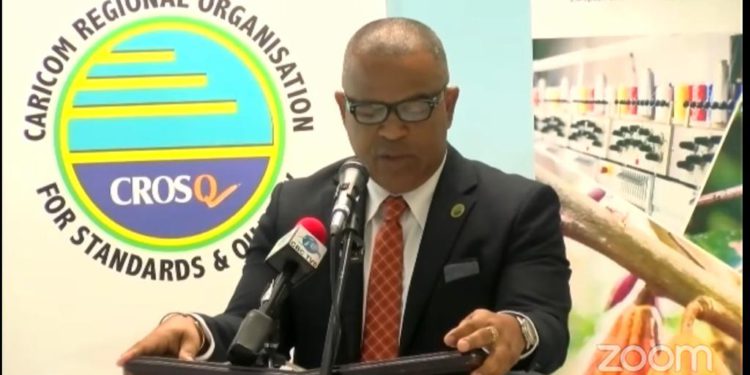Basseterre, St. Kitts, October 11, 2022 (SKNBS): Director of the St. Kitts and Nevis Bureau of Standards (SKNBS) and Chairman of the CARICOM Regional Organisation for Standards and Quality (CROSQ) Council, Stuart LaPlace, has stated that the development of CARICOM’s Regional Quality Infrastructure has not been hampered by global challenges and that projections for its future looks promising.
Mr. LaPlace was at the time speaking at the 41st Meeting of the Council of CROSQ in Barbados on October 10th.
He noted that demand for quality improvement services has increased, especially in response to recent and ongoing global challenges, such as the increased demand for health-related standards and testing, measurement certainty in health and trade-related matters, accredited testing methods and results, and third-party certification services to international management system standards. These challenges have contributed significantly to the industry’s continued development.
“Continued demand is an indication that robust quality infrastructure – namely standards development, metrology, or measurement services development; accreditation, testing, inspection, and certification, as well as quality promotions – are not just important, but vital for any growing economy,” he said. “If we intend to not just survive, but to thrive during these challenging times, quality competitiveness and quality infrastructure must be central tenets.”
The director stated that the need for quality management systems is increasing, and the network of bureau has been collaborating to give information, education, and assistance in this and other areas. He added that they also cooperate with our international colleagues and the CROSQ Secretariat.
“As a network of national standards bureau within the CARICOM Region, CROSQ continues to explore ways in which we can respond collectively and assist each other, particularly during these difficult times of increased quality and price competitiveness – where quality matters even more,” said Mr. LaPlace. “In many cases, our economies are small and our internal markets finite, which is why we need the potential for expansion, which trading provides. And the only way to successfully trade in goods and services is to meet the regulatory and other requirements to enter new and existing markets. Markets that are likewise tightening their own controls. This is where a sound quality infrastructure shows its strength.”
CROSQ has survived for 20 years on the strength of its quality infrastructure, and current engagements and business sector trends point to its ongoing relevance, said Mr. LaPlace. He added that for another 20 years, it will be able to respond to requests and meet the requirements of Member States.
“Thus, because of our commitment to cultivating sturdy and responsive systems, over the past year we have embarked on a process of broadening our collective outlook, through the development of a new strategic plan for the network,” he said. “A scan of the past three years brings us the realisation that times are changing, and that resilience is an aspect of national development to which quality infrastructure can and must contribute. Our new 2022 to 2025 strategic plan begins the process of looking at just how we can continue to answer the call and respond to those needs. It is one of the highlights of this, our 41st meeting.”
-End-







